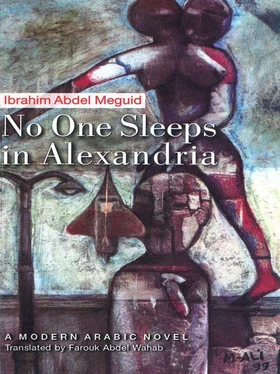“Well, your grandfather should’ve been baptized again.”
“He adamantly refused,” Dimyan laughed. “He insisted that he’d already been baptized and would not submit to those machinations. Deep down he was sad. He went to sleep and hasn’t awakened to this day.”
“There’s no power or strength save in God!” exclaimed Magd al-Din.
“Anyway. My father and his brothers came to hate the village, They divvied up the land and left the village. My father went into business until his money was gone; he left my mother, myself, and two daughters, and another son who died later of typhoid. My sisters have married and are living with their husbands in Suhag. My mother is living with me, hardly ever moving except to sleep. So this was how a big family was ruined because of a little lie. But thank God nobody said that the reverend was rendered incapable of baptizing my grandfather, or that the water in the baptismal basin had dried up when he was about to baptize my grandfather. That would’ve meant big sins, an old curse in the family. Yes, sometimes as the reverend baptized a child, he would be surprised to see that the water had suddenly dried up or that the child clung to his hand and couldn’t be wrenched away.”
Magd al-Din did not know how to comment on this story of his good-hearted friend.
“You’re a pious man, Dimyan,” he said as he looked him in the eye.
“It only seems that way,” Dimyan laughed. “I haven’t been to church for many years. The church of Mari Girgis is only two steps away from my house, and your house too, but I haven’t been to it on Sundays or during the holidays. You know why?”
Magd al-Din was not sure what to think, so he ventured a guess, “Because of what happened to your grandfather?”
“No. I just forget. I always forget. Sometimes I say to myself, Dimyan, you’re unemployed — why don’t you go to Georgius the Martyr, that’s Mari Girgis, he might find you a permanent job. Then I forget, even though I know about Mari Girgis’s many miracles. Muslims sometimes come to him on his anniversary and ask him for help. Mari Girgis is a big saint. You know the saints, of course. You know that the Alexandria city council once tried to demolish the mosque of Abu al-Darda to make way for the streetcar line, but anyone who raised a pickax against the building was paralyzed. So they left it in its place, and now the streetcars go around it. And, as the song tells us, I know that al-Sayyid Ahmad al-Badawi used to liberate the Muslim captives from the enemies. You’re from Tanta, so you know the story better than I do. Besides, brother, I’m confused: Mari Girgis has performed miracles and al-Sayyid Ahmad al-Badawi and Abu al-Darda all have made miracles. They’re all right. So why the distinction between Copts and Muslims?”
Dimyan fell silent for several moments then said, “I have an idea. What do you say I go to Mari Girgis and ask him for work, and you go to Abu al-Darda or Abu al-Abbas and ask for work? Or, how about the other way around — maybe Mari Girgis is angry with me because I’ve stayed away from him too long.”

Magd al-Din did not expect Zahra to cry in such sorrow when she heard the cannon fired in the evening to announce that the following day would be the first day of Ramadan. I le felt the same sorrow and the same need to burst out crying but he pulled himself together. He knew the difference between Ramadan in a big city and Ramadan in their village, where everyone and everything was sympathetic and friendly. A light tap on the half-closed door made Zahra quickly dry her tears.
Khawaga Dimitri and his wife came to wish their neighbors well on the occasion. As Khawaga Dimitri sat down on the sofa next to Magd al-Din, the latter said, “You’re making me fall in love with Alexandria.”
Khawaga Dimitri said with pride, “Alexandria is an ancient city, Mr. Magd al-Din.”
Magd al-Din felt the profound meaning alluded to by his neighbor. It was the tenth of October, and today he had begun work at the Ahliya Weaving Company, a job he hoped would last a long time. Who knows? Maybe this city would open up her kindly heart to him, though he had yet to see it.
“How about a walk now?” asked Khawaga Dimitri. “Ramadan is the month for staying up late.”
“Come and listen to the radio with us,” suggested Sitt Maryam to Zahra.
Magd al-Din went out with Dimitri, and Zahra went with Sitt Maryam into her well-lit room. She saw the room glowing white and the two daughters radiant with delight. The sewing machine was in the middle of the room. Sitt Maryam sat on the chair in front of the sewing machine, while Zahra sat on the sofa with Yvonne. Camilla sat on the opposite sofa looking at Zahra with surprised delight.
Zahra no longer felt shy. She asked Camilla why she was looking at her with such surprise, and Camilla answered, “Because you’re so beautiful!”
Everyone laughed. Sitt Maryam, obviously pleased, said what she usually said about Camilla, “Watch out, Zahra — Camilla’s mischieyous!”
There were some light taps on the half-open door. There was a cool, refreshing breeze. Camilla got up to open the door, then shouted happily, “It’s Sitt Lula!”
Sitt Maryam’s face lit up and so did Yvonne’s. Zahra found herself gazing at Sitt Lula, the well-proportioned blonde with a ruddy complexion. She was wearing a green batiste gown with a floral design and green velvet slippers, but nothing on her head. Her hair shone like radiant amber. As she sat down, Lula said, “My old man went out to spend the evening with his friends at the café, using Ramadan as an excuse.”
“Us, too — our men went out,” said Sitt Maryam with a smile “We’re all in the same boat.”
Everyone laughed, including Zahra this time. Camilla turned on the radio and Abd al-Wahhab’s voice flowed from it. It was obvious that Camilla loved him. The song, “His eyelids teach the art of love” made the girl sway her head to its Spanish swing and laugh. Suddenly she shouted, “Chestnuts!”
Everyone fell silent. Zahra was surprised as everyone listened for the muffled voice echoing in the street. It was the voice of the chestnut vendor, whose words were jumbled, but everyone knew that it was he. He was gone for most of the year, then reappeared again with the beginning of winter. Yvonne went down and bought five piasters’ worth, and Camilla quickly set out a large spirit stove and began to roast the chestnuts. Zahra knew what they were; Magd al-Din had often bought them in Tanta. When Lula took a chestnut and placed it in her mouth for a few moments, her mouth looked very beautiful and her teeth very white. Zahra felt she was in front of an extraordinary woman and watched her as she ate the chestnut slowly with great delight.
She closed her eyes for a few moments, then said, “How great it would be to have chocolate-covered chestnuts! They call it marron glacé, Camilla.”
“Oh, I love marron glacé.”
That was the first time that Zahra had heard the word. She did not show any surprise, but kept it inside. She wondered at Camilla being so merry and full of joy, and her sister Yvonne so quiet and poised. The Lord really works in mysterious ways!
Abd al-Wahhab’s song came to an end, and Camilla got up to turn the tuner knob on the radio, saying “I’ll find some more Abd al-Wahhab,” and indeed found him on another station. She recognized the music. “Oh, what a wonderful song! Sitt Lula!”
Zahra surmised that there was familiarity between Lula and Camilla. She did not understand the difficult song. She had often heard ¡t in the village and would move away from the radio or turn it down or off. She never understood the song. Camilla volunteered to explain it to her. All that Zahra got out of the explanation was that Sitt Maryam was happy with her daughter and her boldness. But Zahra herself did not understand Camilla’s explanation, and could only pretend to be impressed, “Really, all of that in the song?”
Читать дальше













